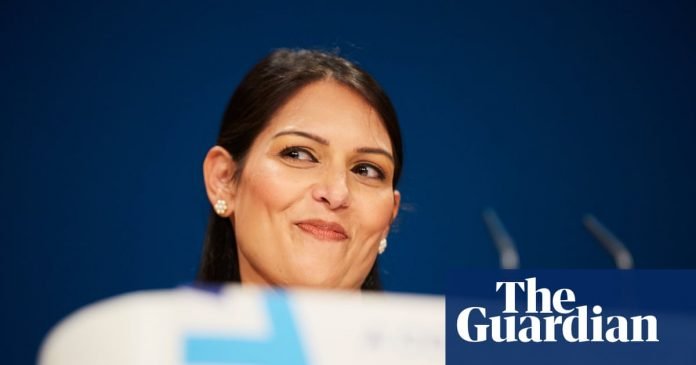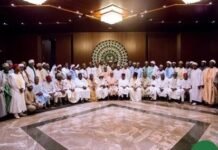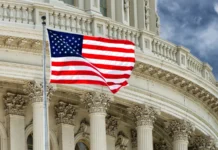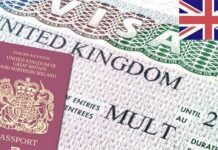A British Conservation Member of Parliament and former Secretary of State for International Development, Ms Priti Patel, is blowing the lid off President Buhari’s touted anti-corruption war, calling it a “smokescreen”.
Ms Patel was reacting in an op-ed she wrote for City A.M. London published on Monday, November 19, 2018 assessing Nigeria’s economic policies under Mr. Buhari.
She cast doubts that President Buhari’s was fighting corruption pointing to the Nigeria’s worsening performance on the global Transparency International’s ranking as one indicator that corruption was getting worse not better under the current administration.
“President Buhari currently faces serious allegations, which include staging show trials of opponents of a regime that is accused of corruption and graft, while simultaneously shielding his own party members and inner circle,” she wrote.
“However, the Nigerian government has continued to flout international law and convention, and it refuses to respect the various court decisions.”
The MP punctured holes in Buhari’s much avowed integrity, wondering how his government was pursuing international investments while at the same time not keeping fidelity with Nigerian judicial pronouncements nor international laws and conventions.
To illustrate her point, Ms Patel pointed to Buhari’s decision to cancel a deal the previous government had made with Process and Industrial Development (P&ID) and refusing to honour court decisions over the resulting conflict.
“In Nigeria, the unhappy experience of the firm founded by two Irishmen, Process and Industrial Development (P&ID), is a case in point, and demonstrates the risk that businesses will face in Nigeria.
“In 2010, P&ID signed a 20-year contract with the Nigerian government to create a new natural gas development refinery, but the project fell through after the Nigerian government reneged on its contractual commitments.
“Upon taking office, President Buhari promptly cancelled a compensation settlement, and has done his level best to pretend Nigeria’s obligations to P&ID do not exist.
“Since Buhari reneged on this deal, P&ID has undertaken legal efforts to affirm a tribunal award, first decided in London. It also made several attempts in court to force the Nigerian government to respect its obligations.
“The most recent court decision at a London tribunal confirmed that the Nigerian government owes P&ID almost $9bn for the initial breach of contract, loss of income, additional costs, and interest accrued after five years of non-payment.

“However, the Nigerian government has continued to flout international law and convention, and it refuses to respect the various court decisions.”
Ms Patel was obviously referring to a well reported case in which a U.S. District Court in Washington D.C. also affirmed a $6.59 billion arbitral award, plus $2.30 billion interest, against Nigeria.
It was later learnt that Nigeria would have paid less than 10 per cent of the $8.9 billion award if the Muhammadu Buhari administration had acted quickly in line with the recommendations of the outgoing government of Goodluck Jonathan n 2015, but mismanaged the situation by failing to show up in court to defend the matter.
Warning against foreign investments in Nigeria
Priti Patal went further warning future investors to, “consider this long-running scandal and weigh this obstinance against Nigeria’s mishandled economic potential.”
“We should all welcome international efforts to attract international investment into developing economies. However, to do this successfully Nigeria must seriously tackle corruption, rather than use it as a smokescreen. It must honour its obligations to companies like P&ID.
“Until then, investors inevitably will be very wary of investing in Nigeria.”
She continued, “As with all investments, investors should know of the corrosive effect of corruption, as well as the lack of transparency and associated difficulties of doing business in certain countries.
She noted that Nigeria’s 145th place on the world’s ranking for ease of doing business “demonstrates the risks of investment into Nigeria”.
Presidency Disagrees, Calls Her Opinion ‘Wicked’
The scathing assessment was not taking lightly by the Nigerian government which is facing a re-election in less than three months and eager to shore up her credentials on the economy to the voters.
The presidency responding called Ms Patel’s op-ed a “wicked proposition lacking in substance and devoid of merit in empirical evidence established by facts”.
Presidential spokesperson, Garba Shehu, released a statement disputing the use of Transparency International report as a yardstick to measure the success of the government’s anti-corruption performance. “Trumpeting a so-called Transparency International report is a false fabrication that cannot be supported by the facts on the ground”.
Shehu said, for example, by the time Mr Buhari was sworn in and took office, the only amount in the anti-corruption recovery account after 16 years of the previous governments being in power was a mere two billion Naira (N2 billion).
“This account has succeeded in netting over four hundred billion Naira (N400 bn) as of today, translating to 1,360% increase. This cannot amount to nothing, in terms of progress,” he said.
He also asserted that when it comes to policy decisions, the Buhari administration has put in place instruments that have “extraordinarily and unprecedentedly reduced corruption and corrupt practices.”
He gave as example, the Treasury Single Account (TSA) put in place by the Goodluck Jonathan administration but implemented by the Buhari administration. He said this has led to greater visibility and control of government funds by way of consolidating government resources in an account as against the past where such accounts are scattered.
“We have established a proper climate of investment on account of which the nation has gained 24 points of excellence in the global ease of doing business index”.
Mr Shehu also said the Bank Verification Number, (BVN), scheme has equally helped the government prevent money laundering, financing terrorism and illicit cash transfers.
“This administration has introduced the IPPS, which implementation has led to an extraordinary reduction of ghost workers, saving the treasury billions of Naira every month.
“The Whistle Blower mechanism put in place has yielded enormously to the treasury and reduced corruption.
In addition to several and urgent legislations targeted at the reduction of corruption, the administration has equally signed a number of highly rewarding Mutual Legal Assistance with a number countries that have translated to tremendous recoveries,” he said.
The presidential spokesperson said the issue of the lack of security of investment raised by Ms Patel is equally false and untenable.
He said Nigeria has recognised the right of the investor, both local and foreign, as enshrined in the nation’s constitution which states clearly that no investment can be taken from its owners without recourse to the law.
“Given the constitution, you don’t even need international protection for assets held in this country. In addition to the constitution, there exist several laws allowing protection for investments. Beyond this, this administration has moved forward by recognising arbitration processes. The judiciary in the country has a Practice Code to give legitimacy to awards and arbitration clauses in agreements.
“Cumulatively, we have established a proper climate of investment on account of which, the nation has gained 24 points of excellence in the global ease of doing business index,” he said.
As for the specific case of the agreement in 2010, between the NNPC and the P&ID for a 20-year contract to create a new natural gas development refinery which appears to be the main issue raised by the UK MP, Mr Shehu said it is “a project that fell through after a past Nigerian government reneged on its contractual commitments, we do not wish to plead the government’s case in the press”.
He said the government of Nigeria, in recognition of the sanctity of the judiciary, has submitted to the jurisdiction of a court in the United States to determine the issues in dispute.
“What we can only say at this point is that Nigerians need to pity their own country for the way things were done in the past.
“Before the coming of the Buhari administration, there existed in the country a racket encompassing elements in the three arms of government, the executive, legislature and the judiciary through the activities of which artificial, engineered and factored breaches of contract are made, judgments are obtained, appeals are delayed and the penalty imposed is paid and shared.
“In the fullness of time, more will be said by the Minister of Justice and Attorney General of the federation,” Mr Shehu said.
Until the clarification from the Justice Ministry, the verdict on Nigeria’s economic policy under Buhari from no less a person than a former UK Treasury Secretary will be canon fodder during this campaign season for Nigeria’s opposition parties which had vigorously disparaged Buhari’s anti-corruption as merely a witch-hunt against perceived political opponents, and of his economic management they say is without “clear and coherent policy direction”.












